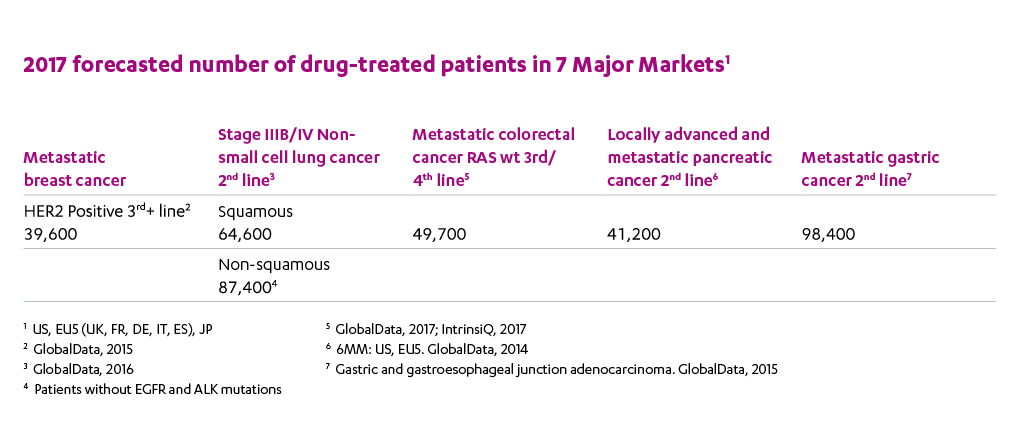Overview
There is substantial preclinical and clinical data indicating that mutation, over-expression, amplification, or activation of the pan-HER receptors are critical to the development, progression and acquired resistance of many epithelial cancers. If one of these receptors is inhibited, cancer cells switch to one of the other receptors through a compensatory upregulation and escape treatment. Sym013 is designed to address this common mechanism of tumor resistance by simultaneous inhibition of all three receptors. Accordingly, we expect that a mixture of pan- HER targeting antibodies will be more effective than current therapies targeted by a single receptor.
Pan-HER, an Antibody Mixture Simultaneously Targeting EGFR, HER2, and HER3, Effectively Overcomes Tumor Heterogeneity and Plasticity
In addition, the cells within a tumor may display extensive heterogeneity and therefore do not respond equally to therapy. This intra-tumor heterogeneity comprises not only clinically important traits such as ability to metastasize and resist therapy, but also the expression of biomarkers or potential therapeutic targets, including the members of the HER family. Sym013 effectively prevents tumor plasticity, which may allow tumor cells to initiate compensatory signaling and escape treatment.
Clinical development of Sym013
A Phase 1 dose escalation trial of Sym013 was initiated in October 2016. After the completion of the Phase 1 trial, we plan to open a number of Phase 2 tumor-specific trials and to evaluate the safety and efficacy of Sym013.
Convincing preclinical data
Results from numerous in vitro and in vivo models of human cancer demonstrate that Sym013 is broadly efficacious against cancer lines of diverse tissue origins and genetic backgrounds in vitro, both in the absence and presence of EGFR ligands and HER3 ligands. Sym013 also effectively induces target down-regulation and prevents compensatory receptor up-regulation in vitro. Importantly, Sym013 effectively suppresses tumor growth in xenograft models of human cancer, including patient-derived models of colorectal and pancreatic cancers. Sym013 is also active in models resistant to EGFR- or HER2-targeted therapeutics (e.g., cetuximab, trastuzumab, pertuzumab and erlotinib) in vitro and in vivo.
Market facts
As witnessed from the preclinical findings, Sym013 may play a role in treatment of a broad range of solid tumor indications with high medical needs globally including breast, lung, colorectal, pancreatic and gastric cancer. Thus, there are significant market opportunities for Sym013.
